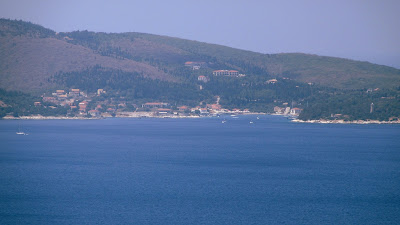Not long ago I sailed with friends on the ferry across the sea from Sami on Cephalonia to Ithaka, home of Odysseus and Penelope. I was in Cephalonia to celebrate a wedding, and with Ithaka just across the channel a visit to the site of such an epic marriage was clearly mandatory. But the archaeologists were not encouraging. There is no palace like those at Mycenae or Pylos, I'd read. And when I consulted a friend about the palace referred to here, the response wasn't hopeful: "As you may surmise, the whole Homeric question is both sensitive locally and has given rise to work which one might politely describe as eccentric... the Agios Athanasios site is actually Hellenistic."
Even so, what would we find when we got there? Perhaps the journey's the thing. Here's Cavafy's famous poem...
"Keep Ithaka always in your mind.
Arriving there is what you are destined for.
But do not hurry the journey at all.
Better if it lasts for years,
so you are old by the time you reach the island,
wealthy with all you have gained on the way,
not expecting Ithaka to make you rich."
However long it takes, you have to get up early. During the week there's only one boat a day from Sami, which leaves first thing. But that has its compensations, as dawn by the sea in Greece is always a stunning experience,
So we arrived on the quay and drove our car onto a rugged-looking ferry along with some tourist buses, backpackers, and delivery vans. As the ship sailed the morning mist still engulfed the island as the sun heated up the hillsides.
The round wound up the mountainside towards Vathy [= Deep] the main town, which lies at the end of a long bay.
And naturally there's a statue of Homer in the main Square.
But not many signs of epic action - at least, not here. So we set off in search of some, following a skimpy guidebook along the stunning cliff road towards the other big town, called Stavros. There we found a small but delightful museum with some Bronze Age pottery and some fine archaic metalwork which had been deposited in what we can imagine was Homer's Cave of the Nymphs, which is in the bay below Stavros.
Excitingly there was a map too which mentioned Agios Athanasios:
And better still there was someone to tell us how to get there!
So off we drove with the kind lady's instructions, and eventually we found a sign to the 'School of Homer', struck hopefully off the road and eventually found it. Still there was a walk uphill to the site through scented olive groves...
Eventually we found some ruins which had been incorporated into more recent farm buildings:
Most of the archaeology had been covered up for protection, but it was possible to peek in and look at the trenches.
Nothing looked very Mycenaean, [I still don't know why it is called Homer's School], but even so the ruins were both impressive and evocative.
There lies the port; the vessel puffs her sail:
There gloom the dark, broad seas...
Come, my friends,
Tis not too late to seek a newer world.
Push off, and sitting well in order smite
The sounding furrows; for my purpose holds
To sail beyond the sunset, and the baths
Of all the western stars, until I die.
It may be that the gulfs will wash us down:
It may be we shall touch the Happy Isles,
And see the great Achilles, whom we knew
Tho' much is taken, much abides; and tho'
We are not now that strength which in old days
Moved earth and heaven, that which we are, we are;
One equal temper of heroic hearts,
Made weak by time and fate, but strong in will
To strive, to seek, to find, and not to yield.
Just below the 'palace' or 'school' we found an ancient cistern with a pool of water in the bottom.
With its corbelled roof,the work seemed 'cyclopean' like the passage to the well at Mycenae:
I was delighted! Even though it didn't actually bring Odysseus [if he existed at all in the real world] any closer. But unless we have this kind of imaginative response, I don't think there's much point wondering about the past anyway. We need to imagine it to understand it properly. The important thing is not to let the dream defy the evidence.
This was a wonderful expedition. My thanks to my fellow explorers. We were all much the better for it,
Here's Cavafy again...
Ithaka gave you the marvelous journey.
Without her you would not have set out.
She has nothing left to give you now.
And if you find her poor, Ithaka won’t have fooled you.
Wise as you will have become, so full of experience,
you will have understood by then what these Ithakas mean.
.

















